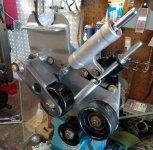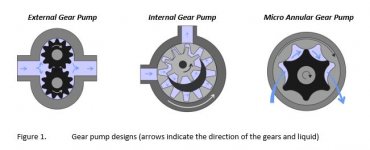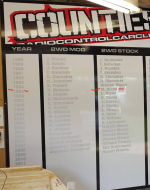Turbos generally use journal bearings, which require an oil film; there are some ball bearing units, and they tend to last longer simply because they don't need nearly as much lubrication. Pretty much all of the superchargers I've run personally were self-contained, oil-filled units. None had external coolers, and I've had no internal drive failures. I know VMP and Kenne Bell have/had externally cooled gear drives, but I don't know anyone who's actually run one.
In the sledgehammer's case (no pun intended), I'm running angular contact bearings, unsealed, with just some Kluber isoflex nbu-15 grease in them. I have yet to actually re-lube them, and there's really nothing to keep the grease in place; yet enough of it is staying there.
As for the RC guys, they generally don't use any sort of oil in the gears - they're out in the open. Our setups are in many ways less demanding - much shorter run times, virtually no shock loads, relatively constant speed/load once accelerated, etc. There are some downsides to running in a oil bath or even a lightly greased setup like mine. For gears, very high rpm + oil is a bad idea because the oil has to get progressively thinner the faster you go - there's less time between teeth to shed the oil, and the gears end up trying to compress the oil, which is of course essentially uncompressible, creating what can end up being very high side loads on the the rotating parts. In the case of ball bearings (this is straight from the Kluber engineers), you can hit a point where the balls no longer roll, but start to slide - which is the opposite of what you actually want; and leads to friction, heat and eventual failure, even though there is plenty (actually too much) lube. Which is why they were fine with me using their grease on unsealed bearings; just being aware that it's a maintenance point (they actually gave me an estimated interval to re-lube - and under light use, they recommended trying about once a year).
Also, the experiments with the belt driven unit has shown me flaws with extreme-speed belt drives too. All of this is why my initial (successful) e-boost endeavors relied on not only no belts or gears (after building a number of supercharger belt drives from scratch, down to even making my own tensioners out of necessity; having experienced violent failures causing significant damage); here's one of my favorites from years past - a custom setup using a Hyabusa steering damper filled with 50 weight oil, some ball bearings, steel and a spring from a porch swing (not what's in the picture; that came later after testing):

Anyway, my point is all of this stuff is what drew me to direct drive and the now-infamous hex drive coupling - which allows for high speed operation and a tiny bit of misalignment. I think for a gear drive setup, our best bet is to accept that they are a wear item, even s they should last a good long time, and at least 1 if not both should be made from a material that doesn't rely on the need for continual lube, since that can cause the problems I outlined above. Think of this - the gears in my lathe aren't lubed, and have basically a "life of the machine" life, even though they're made from steel - though of course they don't see crazy high speed. Materials that I would be interested in considering would be bronze, iron (the graphite in iron is an excellent lube - which is why when you machine iron, you don't need a cutting oil), perhaps even some composites - like nylon, carbon-impregnated nylon, etc. Iron and composites would also function as mechanical fuses too - I'd rather the gears fail than the impellers and having the engine ingest a ton of metal as a result.
But in any case, I think we're likely to find that for our purposes, as long as we view the gears as wear items and use reasonable material (I bet even steel would eventually polish itself to relatively low friction levels), going without an oil bath is actually the more reliable way to go.
After all, most engines use one of these 3 types of oil pumps; and they're all basically gear based:

And at our running rpms, we're basically going to just end up pumping any sort of wet lube out anyway to the point of cavitation.
This turned out to be way too long, and as always, I may be wrong, but I'm certainly willing to put my money and time where my mouth is to find out for sure.



